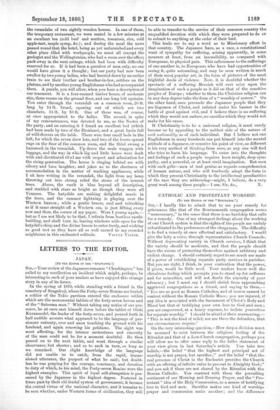LETTERS TO THE E D I TOR.
JAPAN.
[TO THE EDITOR OF THE "SPECTATOR?)
Sia,—Your review of the Japanese romance " Chnshingura" has called to my recollection an incident which might, perhaps, be interesting to such of your readers as have enjoyed this strange story in any of its forms.
In the spring of 1876, while standing with a friend in the cemetery of Sengakuji, where the Forty-seven Ronins are buried, a soldier of the Tokio garrison entered the enclosure within which are the monumental tablets of the forty-seven heroes and of the "Satsuma man." Without taking any notice of our pre- sence, he at once cast himself down before the tablet of Oishi Kuranosuk6, the leader of the forty-seven, and poured forth in half audible accents what appeared to be the language of pas- sionate entreaty, ever and anon touching the ground with his forehead, and again renewing his petitions. The sight was most affecting, for the intense earnestness and sincerity of the man could not be for a moment doubtful. He then passed on to the next tablet, and went through a similar observance, but shorter ; and so to each in turn, so long as we remained. Our slight knowledge of the language did not enable us to catch, from the rapid, impas- sioned utterance, the purport of what he said ; but doubt- less he was praying for the courage, constancy, and devotion to duty of which, to his mind, the Forty-seven Ronins were the highest examples. This spirit of loyal self-abnegation is pos- sessed by the Japanese in the highest degree. Fostered in times past by their old feudal system of government, it became the central virtue of the national character, and it remains to be seen whether, under Western forms of civilisation, they will be able to transfer to the service of their common country the unqualified devotion with which they were prepared to do or to submit to anything at the order of their lord. This leads me to say a word as to Missionary effort in. that country. The Japanese have, as a race, a constitutional want of sympathy for suffering, arising apparently, in some measure at least, from an insensibility, as compared with. Europeans, to physical pain. This callousness to the sufferings of one another is, to Europeans who have had opportunities of seeing it, quite astounding, and may be seen written in much of their most popular art, in the form of pictures of the most frightful deeds of violence. Now, it is doubtful whether the spectacle of a suffering Messiah will ever seize upon the imagination of such a people as it did on that of the sensitive peoples of Europe ; whether to them the Christian religion can in any deep degree take the form of a "worship of sorrow." On the other hand, once persuade the Japanese people that they are liegernen of Christ, and enlisted under his banner in the battle of goodagainst evil, and I believe there is no suffering which they would not endure, no sacrifice which they would not make for his cause.
If Christianity is to be a universal religion, it must surely become so by appealing to the noblest side of the nature of each, nationality, as of each individual. But I believe not one Englishman in many hundreds can put himself into the mental attitude of a Japanese, or conceive his point of view, so different is his very method of thinking from ours, as any one will find who tries to learn his language. To enter into the thoughts. and feelings of such a people requires keen insight, deep sym- pathy, and a powerful, or at least vivid imagination. But men with such gifts—men of real genius as regards comprehension of human nature, and who will fearlessly adapt the form in. which they present Christianity to the intellectual peculiarities. of the race they are addressing—might, I believe, do a very great work among these people.—I am, Sir, Sm., X.


































 Previous page
Previous page